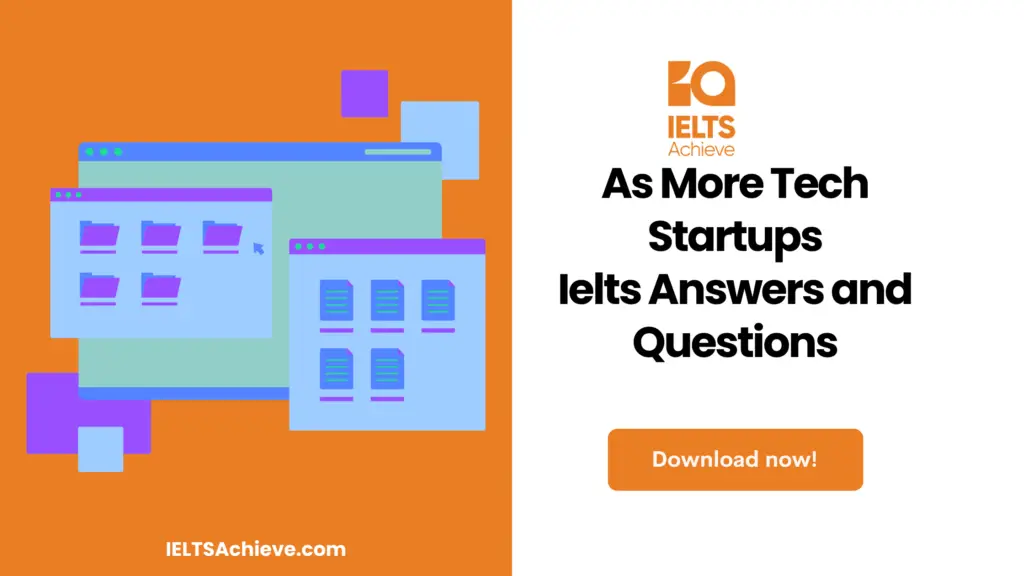The Blog post contains the following IELTS Reading Questions:
- IELTS Reading True/ False or Not given
- IELTS Reading Sentence Completion
- IELTS Reading Multiple Choice Questions

IELTS Reading Passage – As more tech startups
As more tech startups stay private
A. Once upon a time, if you were a young, audacious technologist with a world-conquering startup idea, you presumably spent the majority of your conscious hours working toward a single business milestone: going public. Despite the fact that tech industry luminaries have always expressed scepticism and even hostility regarding the finance industry, tech’s dirty little secret was that it sought validation and wealth from Wall Street and the IPO ritual. In the last few years, however, something peculiar happened: the initial public offering of stock has dwindled out of favour. For Silicon Valley entrepreneurs and their employees, an initial public offering is now no longer the primary goal. Instead, numerous business owners view going public as a necessary evil that should be postponed as long as possible because it includes more drawbacks than advantages.
B. The chief executive of Mattermark, a start-up that organises and sells information about the start-up market, Danielle Morrill said, “If you can get $200 million from private sources, then yeah, I don’t want my business scrutinised by the unwashed masses who don’t understand my business.” “This is truly horrifying to me.” Silicon Valley’s sudden resistance to initial public offerings, which is partially rooted in Wall Street’s scepticism of new tech stocks, may be the single most significant psychological shift underlying the current tech surge. Staying private affords start-up executives the luxury of not caring about the viewpoints of outsiders and permits them to avoid the quarterly earnings treadmill. It also means Wall Street is doing what it abandoned to do during the previous tech boom: valuing companies using traditional metrics such as growth and profitability. For instance, investors have been critical of Twitter because its user growth has halted. Box, a cloud-storage company that went public last year but remains unprofitable, has been exposed to severe examination. And the e-commerce firm Zulily, which went public the last year, was likewise punished when it lowered its sales forecast.
C. The managing partner at the venture capital firm Andreessen Horowitz, Scott Kupor, and his colleagues stated in a recent report that despite all the attention devoted to start-ups over the previous few years, tech stocks are not being valued at higher prices. In fact, their market share has remained stable for the past 14 years and is well below its peak in the late 1990s. This unwillingness to provide plenty of flexibility to developing technology companies reduces the risk for regular investors. If the bubble bursts, it will be less likely that the messy multitudes, if that is what we are, will be washed away. Private investors, on the other hand, are placing substantial bets on what are referred to as unicorns, the Silicon Valley terminology for entrepreneurs with a valuation of over a billion dollars. If any of these unicorns fail, losses will be restricted to venture capitalists and hedge funds that have begun investing in new technology companies, as well as tech founders and employees.
D. Unicorns are influenced by their unwillingness or, on certain occasions, their incapacity to go public. Entrepreneurs have more time to develop profitable business models when they rely on private investors for a longer period of time. To delay their entry into the public markets, Airbnb, Dropbox, Palantir, Pinterest, Uber, and a number of other significant entrepreneurs are raising hundreds of millions, and in certain instances billions, of dollars that they would have acquired through an offering to the public. Dan Levitan, the managing partner of the venture capital firm Maveron, recently told me, “These companies are going public, just in the private market.” In many cases, hedge funds and other international investors who would have acquired shares in these businesses following an IPO are opting to participate in late-stage private rounds. There is even an oxymoron for the method of collecting money from individuals in lieu of a public offering: private placement. It is commonly referred to as a “private I.P.O.”
E. Some venture capitalist companies have altered their company procedures due to the delay in I.P.O.s. Maveron, for example, instead of waiting for an initial public offering, now transfers its stake in a startup to other, larger private investors once it has approximately 100-folded its initial investment. It is the type of return that was once achievable only after an I.P.O. However, the latest version of the original offerings has a drawback. When the unicorns eventually go public and start to thrive — or whatever it is that healthy fanciful horned creatures tend to do — the wealthy individuals who are currently maintaining the majority of the risk will be the largest conquerors. In the past, public investors who got involved in the earliest stages of an initial public offering could earn historic profits. If you had invested $1,000 in Amazon’s initial public offering in 1997, you would have roughly $250,000 currently. In 1986, if you had invested $1,000 in Microsoft, you would have approximately $500,000 today. Such gains from tech IPOs are extremely unlikely for public investors today. Before the introduction of technology companies to the market, private investors have already extracted the greatest returns.
F. According to statistics maintained by Jay Ritter, a professor of finance at the University of Florida, in the late 1990s and early 2000s, hundreds of technology companies went public annually; however, in 2014, 53 technology companies went public, which is near to the median since 1980. Today’s companies are waiting longer as well. In 1980, the median age of tech I.P.O.s was seven years; by 2014, the median age had risen to 11 years. Over the last several weeks, I’ve asked a number of entrepreneurs and investors why they’re waiting. While few were ready to talk publicly about their businesses, the most common response was “What’s the point?” Insiders at private companies may now use novel techniques, such as selling shares on an underground market, to cash in on part of their shares in to recompense employees and founders who organised a lot of stock previous to the company turning into public. However, some have pointed out that employees who aren’t supplied with much information about the business’s accomplishments may be getting little benefit from the new practice.
G. According to Ms.Morrill of Mattermark, “one thing workers may be confused about is that whenever organisations tell them, ‘We’re essentially running a private I.P.O.,’ it may make them believe there’s a lower risk than there really is.” But she acknowledged that convincing them that their paper benefits would never materialise was difficult. “The Kool-Aid is really powerful,” she said. Some researchers have suggested that tech enterprises ought to investigate alternate forms of contribution for staff members if delay in I.P.O.s becomes the norm in Silicon Valley. Mr. Kupor of Andreessen Horowitz stated, “We probably need to completely reconsider how private organisations recompense their employees because this will be a problem.”
H. Marc Andreessen, founding member of Andreessen Horowitz, recently told reporter Dan Primack that in his professional life, the recent appearance to Andreessen Horowitz’s limited partners, the organisations that give money to the venture firm, was the first time he had seen such a stark differences between how investors address public and private company chief executives. According to Mr. Andreessen, “they tell the public the chief executive officer, ‘Give us the funds back this quarter,’ but they tell the private CEO, ‘No problem, operate the company for 10 years. At some point, this strain will eventually resolve. Mr. Levitan, of Maveron stated, “Private evaluations will not remain ever higher than public evaluations.” Therefore, the question is whether private markets will surrender and decrease or whether public markets will rise. Workers, founders, and a number of hedge funds may be held responsible if the private investors are incorrect. But if they are accurate, you and I will be the ones with frowns on our confronts: the public investors who missed out on the next excellent occasion.
As more tech startups IELTS Reading Questions
Questions 1-4
Answer the question from True/ False or Not Given.
TRUE if the statement agrees with the information
FALSE if the statement contradicts with the information
NOT GIVEN there is no information on this
1. Private investors are bearing most of the risk.
2. Not many investors were willing to speak on the record.
3. The typical tech company hitting the markets in the 1990s was 5 years old.
4. Marc Andreessen, the firm’s co-founder, expressed amazement with divergency in how investors treat the public.
Enhance your skills in identifying information as True, False, or Not Given. Click here to discover expert strategies and techniques for mastering this question type in the IELTS Reading section.
Questions 5-9
Complete the sentence below. Write the correct letter in your answer sheet.
5. Scepticism was always expected by the __________ of the tech industry. 6. The new aversion to initial offerings has its ___________ . 7. Selling shares on a secondary market is considered a ___________ mechanism. 8. Workers’ compensation might be an ___________. 9. The public investors who failed to participate in the next big thing might be the ones wearing the ___________ .
Enhance your sentence completion skills in the IELTS Reading section. Click here to access our comprehensive guide and learn effective strategies for filling in missing words or phrases in sentences.
Questions 10-13
Choose the correct letter, A, B, C or D
10. how much funds would you gain by now, if you had invested 1000$ in Amazon in 1997?
A. 250,000$
B. close to 500,000$
C. It is not stated in the text
D. No funds
11. Nowadays founders talk about going public as a
A. necessity.
B. benefit.
C. possibility.
D. profit.
12. In which time period was the biggest number of companies going public?
A. early 1990s
B. late 1900s and 2000s
C. 1980s
D. late 1990s
13. According to the text, which of the following is true?
A. Private valuations may be forever higher than public ones.
B. Public valuations eventually will become even less valuable.
C. The main question is whether the public market increases or the private market decreases.
D. The pressure might last for a long time.
Ready to improve your performance in Multiple Choice Questions (MCQs)? Click here to access our comprehensive guide on how to tackle MCQs effectively in the IELTS Reading section.
Unlock your full potential in the IELTS Reading section – Visit our IELTS Reading Practice Question Answer page now!
Recommended Questions:
Renewable Energy IELTS Reading Question with Answer
As more tech startups reading answers
1. True
2. True
3. Not Given
4. False
5. luminaries
6. drawback
7. novel
8. problem
9. frowns
10. A
11. A
12. B
13. C

We hope you found this post useful in helping you to study for the IELTS Test. If you have any questions please let us know in the comments below or on the Facebook page.
The best way to keep up to date with posts like this is to like us on Facebook, then follow us on Instagram and Pinterest. If you need help preparing for the IELTS Test, join the IELTS Achieve Academy and see how we can assist you to achieve your desired band score. We offer an essay correction service, mock exams and online courses.

